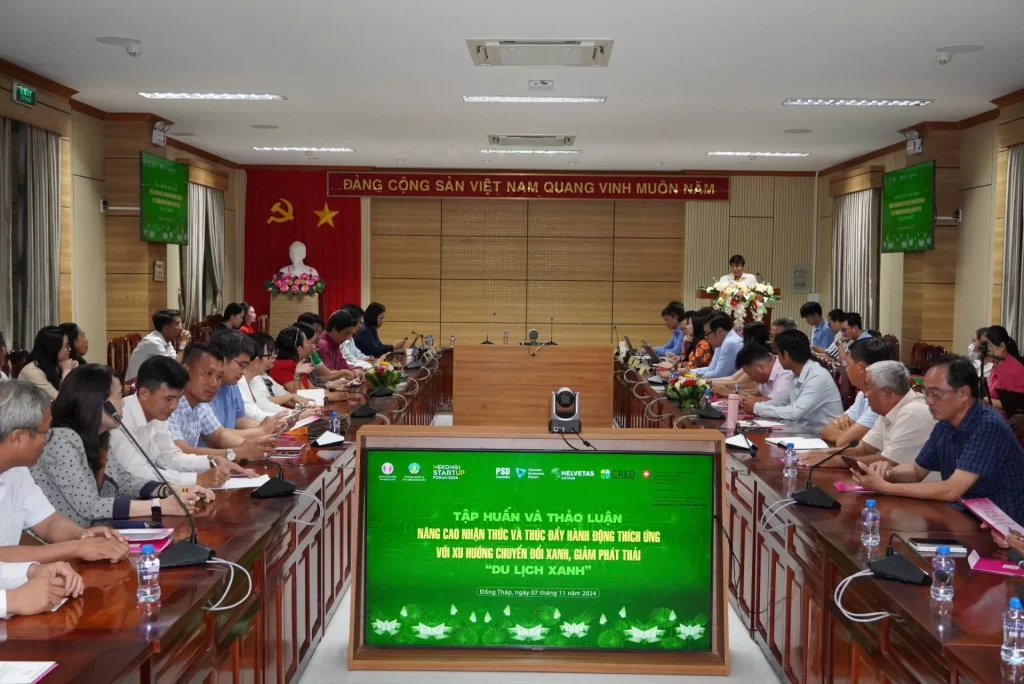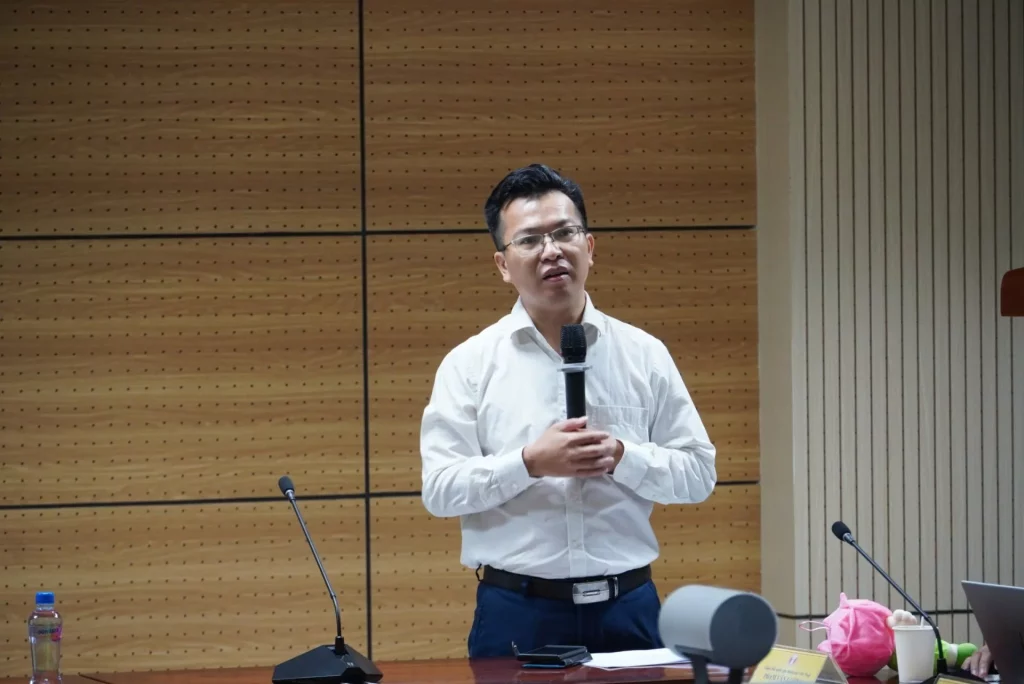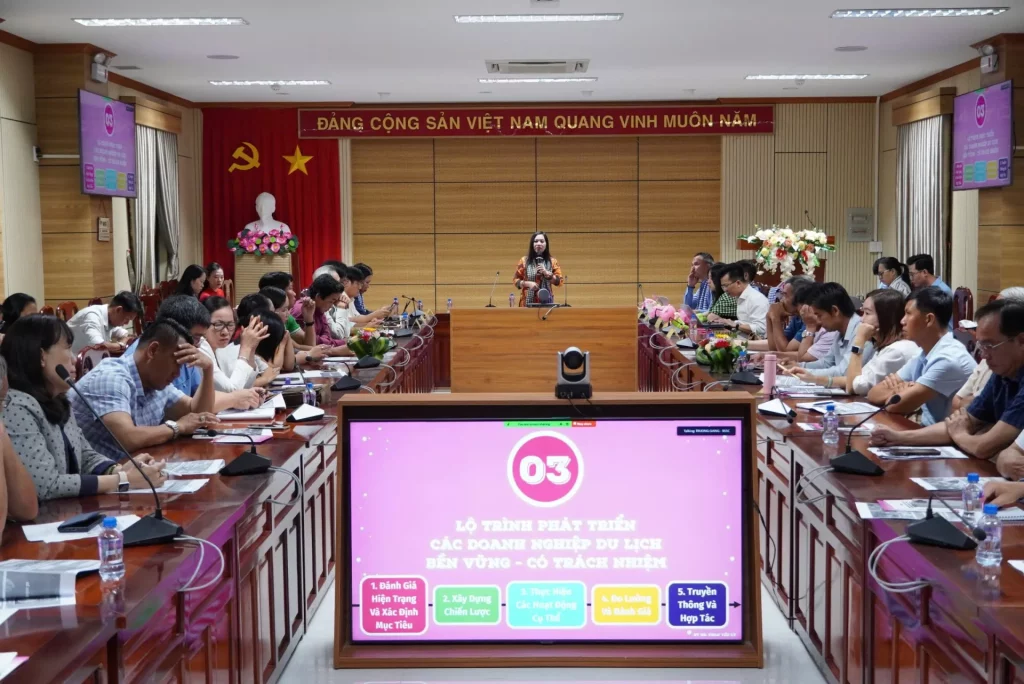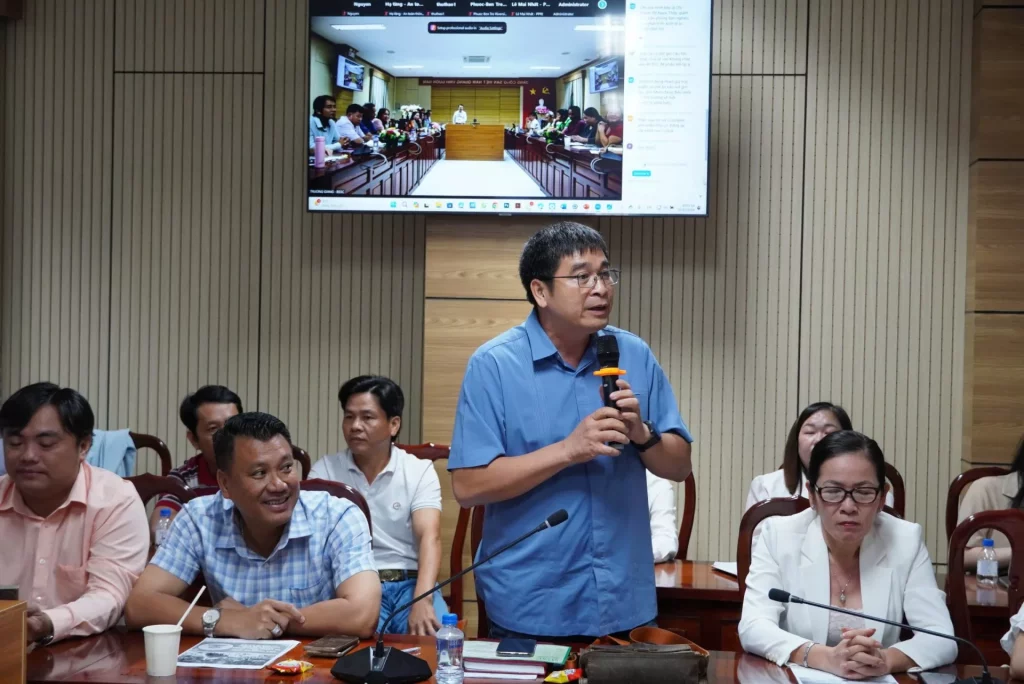DONG THAP – Representatives from businesses, startups, and innovation organizations participated in a training program on green tourism on the morning of 7th November 2024, held both in-person at the Dong Thap provincial People’s Committee conference hall and online via Zoom.
Speaking at the event, Mr. Le Quang Bieu, Deputy Director of the Dong Thap provincial Department of Culture, Sports, and Tourism, shared several green models combining agriculture with tourism. These models not only help enhance the value of local agricultural products and culture but also contribute to environmental protection and the preservation of natural resources. He expressed hope that after attending the training,businesses interested in the Mekong Delta region would be able to identify opportunities, challenges, and solutions to promote economic development, as well as new business models linked to the green economy.
Mr. Pham Van Luong, Country Director of Helvetas Vietnam, expressed his pleasure in continuing to accompany Dong Thap province in its green and sustainable development through the ST4SD project. In the coming time, the project will provide technical support for the province through activities that support the implementation of sustainable tourism policies via public-private engagement. The project will also assist in the development and application of sustainable destination management models, support the selection and implementation of sustainable tourism development initiatives in the province, and enhance the capacity and quality of the province’s tourism workforce to meet the demands of sustainable development.
“We hope that our partnership through the ST4SD project will make a contribution to achieving the sustainable tourism development goals of Dong Thap province, making it one of the most attractive, sustainable, and exemplary tourism destinations in the Mekong Delta region and in Vietnam as a whole in the near future,” Mr. Luong said.

Global Green Transition and the Readiness of Vietnamese Businesses
At the training session, Dr. Bui Thanh Minh, Deputy Director of the Office of the Private Sector Development Research Committee (Committee IV), provided an overview of the green transition policies and sustainable development efforts of countries around the world, as well as Vietnam’s international commitments. Specifically, at the 26th United Nations Climate Change conference (COP26), Vietnam, along with nearly 150 countries, promised to achieve net-zero emissions by 2050. The country also joined over 100 nations in committing to a global methane emissions reduction initiative by 2030, signed the Glasgow Leaders’ Declaration on Forests and Land Use with 140 other countries, and participated in the Global Declaration on the Transition from Coal to Clean Energy with 48 nations.
According to the 2023 Provincial Green Index (PGI) report by the Vietnam Chamber of Commerce and Industry (VCCI), the top 10 provinces and cities in Vietnam with the highest green indices are: Quang Ninh, Da Nang, Dong Nai, Hung Yen, Ho Chi Minh City, Tay Ninh, Hai Phong, Ba Ria-Vung Tau, Ha Nam, and Vinh Long. This index evaluates and ranks localities based on their environmental friendliness from a business perspective, including factors such as compliance with environmental laws, the application of environmentally friendly technologies by local businesses, corporate governance and environmental practices, as well as local government policies that encourage eco-friendly investment and other important environmental issues.

A survey by Committee IV on the readiness of businesses for emission reduction and green transition in 2024 showed that only 3.8% of businesses had implemented emissions tracking and published annual reduction results, while 64% had not made any preparations. For most businesses, the main challenges in reducing emissions and transitioning to green practices are a lack of capital and skilled personnel to carry out the necessary changes.
According to Dr. Minh, companies need to take several initial steps to promote green and sustainable development, such as: complying with national and international green transition regulations and standards (such as greenhouse gas inventory requirements); enhancing B2B cooperation with organizations and consultants on technical and technological solutions for the transition; participating in training programs to raise awareness of policies, legal frameworks, and practical trends in the green transition; and promoting green initiatives within businesses, including energy transformation, optimizing production processes, operations, circular economy practices, and recycling.
“I hope that businesses will start with emission reduction projects, promote green, eco-friendly, and creative tourism models. Besides, agricultural tourism is a strong point of the Mekong Delta region,” Dr. Minh said.
Building a model and roadmap for developing tourism businesses sustainably
At the event, tourism expert Phan Yen Ly, Director of Canh Cam Event Consulting, Media and Event Company, emphasized that sustainable tourism is not just a trend but an inevitable direction for global tourism. According to Mrs. Ly, the Vietnamese government has policies supporting sustainable development, and some tourism firms and destinations in Vietnam have started adopting the standards set by the Global Sustainable Tourism Council (GSTC). However, the implementation process still faces many challenges and requires efforts from businesses, the community, and the government.

Mrs. Ly noted that when applying the GSTC standards in Vietnam, attention should be paid to raising awareness of sustainable tourism among stakeholders; providing technical and financial support to companies; creating coordination between management agencies, businesses, and communities; and training a workforce skilled in sustainable tourism practices.
Green models, which are suitable for the Mekong Delta region, include ecotourism, adventure tourism, cultural tourism, and community-based tourism. Mrs. Ly also proposed specific programs and activities aimed at responsible and sustainable tourism in the Mekong Delta, such as continuing to promote tours to key tourism development areas linked to the conservation and enhancement of the values of forests, seas, and biosphere reserves. Other recommendations include focusing on designing agricultural and ecotourism products tied to the development of local OCOP (One Commune, One Product) goods and specialties; supporting travel agencies in implementing green tours with green transport options (electric vehicles, bicycles, boats, and canoes); organizing green activities that are close to nature and protect the environment; offering green journeys to visit natural heritage sites, agricultural, historical and cultural destinations, and handicraft villages; promoting green accommodations (staying in hotels with green criteria); and green cuisine (using fresh vegetables, fruits, and organic food). These services should be delivered by “green tourism” staff with the knowledge and skills to spread the message of environmental protection, resource conservation, and cultural heritage preservation.

Sharing at the training session, Mrs. Pham Thi Ngoc Thuy, Director of the IV Department Office, said that the business community is very interested in topics such as an overview of legal documents and policies affecting them, information on successful green tourism models both domestically and internationally, and methods to save energy and optimize resource usage.
In the discussion, representatives from tourism companies and experts exchanged views on opportunities, challenges, and solutions to promote new business models with the connection to the green economy.
This training program is part of the “Mekong Startup Forum 2024,” organized with funding from the Swiss State Secretariat for Economic Affairs (SECO) and technical support from Helvetas Vietnam and the Center for Rural Economic Development (CRED).